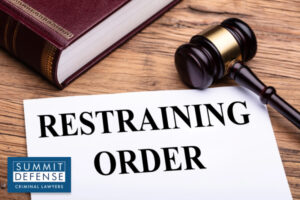 A domestic violence charge can have a serious impact on your ability to keep custody of your children. Courts in California take these cases very seriously, especially when a child’s safety might be at risk. If you are accused of domestic violence, you might be wondering if the court will take your children away or limit your time with them. While each case is different, a domestic violence charge can influence custody decisions in several ways.
A domestic violence charge can have a serious impact on your ability to keep custody of your children. Courts in California take these cases very seriously, especially when a child’s safety might be at risk. If you are accused of domestic violence, you might be wondering if the court will take your children away or limit your time with them. While each case is different, a domestic violence charge can influence custody decisions in several ways.
Summit Defense Criminal Lawyers helps parents across California protect their rights in child custody cases. If you are facing domestic violence charges, your parental rights may be at risk, even before a criminal conviction. The court may limit your parenting time or order supervised visitation if they think the child could be harmed.
Understanding how domestic violence allegations can affect custody arrangements is important, especially when you are trying to protect your bond with your children.
Why Domestic Violence Allegations Matter in Custody Cases
When domestic violence allegations come up in a custody case, the court must consider the child’s safety first. Judges look at whether the child was involved, saw the abuse, or is in danger from an abusive parent. Even if the child was not hurt directly, the court may still believe the child’s emotional health is at risk.
These accusations can lead to big changes in custody arrangements, including limits on visits or even loss of full custody.
What the Court Considers in These Situations
 In custody cases involving domestic violence, the court looks at many factors to decide what is best for the child. These include the type of abuse, how often it happened, and if there are protective orders in place.
In custody cases involving domestic violence, the court looks at many factors to decide what is best for the child. These include the type of abuse, how often it happened, and if there are protective orders in place.
Nature and Severity of the Alleged Abuse
The court checks how serious the domestic abuse was. Was it physical, emotional, or both? Was it a one-time fight or part of a pattern of behavior? A severe incident may carry more weight, especially if it led to injury, police reports, or medical records. The more serious the abuse, the more it can affect custody decisions.
Criminal Charges or Restraining Orders
If there are criminal charges or restraining orders, the court pays close attention. A judge may think that a parent with domestic violence charges is a danger to the child. Even before a guilty verdict, the court can order supervised visitation or limit contact. Protective orders are strong signals that safety might be a concern.
Pattern of Behavior vs. One-Time Incident
| Factor | Pattern of Behavior | One-Time Incident |
|---|---|---|
| Definition | Repeated acts of domestic abuse over time | A single act of domestic violence with no known history |
| Impact on Custody | More likely to lose legal custody or only be allowed supervised visits | May still affect custody, but courts may allow parenting time with conditions |
| Court’s View | Shows a continuing threat to the child or other parent | Might be seen as an isolated mistake if there is proof of change |
| Protective Orders | Likely to result in long-term or permanent protective orders | May lead to temporary protective orders only |
| Evidence Considered | Police reports, witness statements, past court records, and behavior patterns | Specific incident details, including medical records or 911 calls |
| Effect on Parental Rights | Higher risk of losing full custody | May keep some rights if the parent shows remorse and follows court orders |
Impact on the Child
Domestic violence can deeply affect a child’s emotional well being, even if the child was not the direct victim. Seeing or hearing violence between parents can lead to fear, stress, and confusion. This harm can stay with them for a long time.
Courts take the child’s physical and emotional health very seriously. If a judge believes that a child has suffered because of a parent’s actions, they may limit contact or order supervised visitation. The main goal in child custody cases is to protect children from further harm and provide a safe, stable home.
Can You Lose Full Custody or Just Visitation?
In domestic violence cases, courts can remove both physical and legal custody from the accused parent, depending on how serious the situation is. If the court believes the child’s well-being is at risk, it may award full custody to the other parent and limit the accused parent’s involvement to supervised visits only. This can happen even before the legal process is finished, especially if there is strong evidence of harm or danger.
Judges are careful when determining custody arrangements, especially when domestic violence is involved. They want to make sure the child is safe both physically and emotionally. In some cases, the court may decide that joint custody is not possible because of past abuse or fear of future harm.
Even if the abuse happened only once, the court might still see it as enough reason to block regular parenting time. Losing full custody is more likely if the court believes the accused parent cannot provide a safe home.
What Happens If There Is a Restraining Order?
 When a restraining order is in place, it can greatly change how the legal process unfolds in child custody matters. Courts often treat these orders as a sign that the child or the other parent may be in danger, especially in domestic violence cases. If the order blocks contact, the accused parent may not be able to see or speak to the child until the court reviews the case again.
When a restraining order is in place, it can greatly change how the legal process unfolds in child custody matters. Courts often treat these orders as a sign that the child or the other parent may be in danger, especially in domestic violence cases. If the order blocks contact, the accused parent may not be able to see or speak to the child until the court reviews the case again.
A restraining order can affect both physical and legal custody right away. It may prevent joint custody or any shared decision-making about the child’s life. Judges focus on the child’s well-being, and if the protective order shows a risk of harm, even visits might need to be supervised. The court uses these orders as part of its decision when determining custody arrangements, especially when safety is a major concern.
How to Protect Your Custody Rights During a Domestic Violence Case
If you have been accused of domestic violence, your custody rights can be affected quickly, even before the case is finished. To protect your physical and legal custody, you must take the right steps early in the legal process. The court’s main concern is the child’s well-being, so how you respond can influence the final custody decision.
Hire a Family Law Attorney Immediately
Hiring a skilled family law attorney right away can make a big difference in how your case turns out. An experienced lawyer understands how domestic violence cases can affect child custody and can guide you through the legal process step by step. They will help you build a strong defense, gather important evidence, and represent your side in court.
With the right legal help, you can take action to protect your parenting time and work toward keeping physical and legal custody of your child.
Follow All Court Orders
Following every court order is not only a sign of respect for the legal system but also a key way to protect your custody rights during domestic violence accusations. Judges often look at how each parent behaves during the legal process. If you fail to follow court-ordered visitation schedules, protective orders, or parenting rules, the court may see you as a threat to your child or other family members.
Obeying these orders shows the court that you are taking the situation seriously and are committed to your child’s safety, which can help you keep some level of custody.
Document Your Side of the Story
When you are facing domestic violence accusations, it is important to gather and keep records that show your side of the situation. These can include texts, emails, voice messages, and witness statements from trusted family members or friends who were present. If you believe the claims are false, the burden may fall on you to help your legal counsel prove the domestic violence allegations are not true.
Keeping a clear and organized record of events can help your attorney challenge the claims and present a more complete picture to the court.
Request a Custody Hearing
If your parenting rights have been limited or taken away due to domestic violence accusations, you have the right to ask for a custody hearing. This hearing gives you and your legal counsel a chance to respond to the allegations, show any evidence you have, and explain your relationship with your child and other family members.
During the hearing, you may also present proof that the domestic violence allegations are false or that you have taken steps to improve, such as attending counseling or following court orders. Asking for a custody hearing can be an important part of protecting your long-term rights as a parent.
Rebuilding Custody Rights After a Domestic Violence Case
 Even if you have lost physical and legal custody because of domestic violence accusations, it is still possible to work toward restoring your parental rights over time. Courts may be open to changes in custody arrangements if they see clear signs that you are no longer a risk to your child or other family members. This may include finishing anger management programs, attending parenting classes, and fully complying with all court orders.
Even if you have lost physical and legal custody because of domestic violence accusations, it is still possible to work toward restoring your parental rights over time. Courts may be open to changes in custody arrangements if they see clear signs that you are no longer a risk to your child or other family members. This may include finishing anger management programs, attending parenting classes, and fully complying with all court orders.
You may also need to show that you have stayed out of legal trouble and are working closely with legal counsel to improve your situation. In many cases, parents who prove they are stable and focused on the child’s well-being may be given a chance to rebuild trust with the court and the other parent. This can lead to increased parenting time, a return to joint custody, or even regaining full custody if the judge believes it is safe.
Can False Accusations Affect Custody Too?
False accusations of domestic violence can also have a serious effect on custody outcomes. Even when there is no proof, the court may temporarily restrict your access to your child while reviewing the situation. If you are wrongly accused, it is critical to work with legal counsel to gather evidence that shows the accusations are false and made in bad faith.
When one parent lies to damage the other’s custody rights, it can backfire. Judges do not take false claims lightly, especially when they are used to manipulate the legal process or harm the relationship between a parent and child. If the court finds that the other parent made up the domestic violence accusations, that parent may lose credibility or even face penalties, which can change custody decisions in your favor.
Speak to a Custody Lawyer if You Are Facing Domestic Violence Charges
 If you are dealing with child custody and domestic violence charges at the same time, it is critical to seek legal assistance as early as possible. These cases are often complex, especially when they are being handled in both criminal court and family court. Without strong legal support, you could lose custody, face restricted visitation, or have your parental rights taken away for a long time.
If you are dealing with child custody and domestic violence charges at the same time, it is critical to seek legal assistance as early as possible. These cases are often complex, especially when they are being handled in both criminal court and family court. Without strong legal support, you could lose custody, face restricted visitation, or have your parental rights taken away for a long time.
A skilled custody lawyer who works closely with a criminal defense lawyer can help you protect your rights and respond to both the family law and criminal aspects of your case. Whether you are dealing with a genuine charge or facing false allegations, having leading attorneys on your side makes a major difference. They can help you build a clear case, respond to protective orders, and work toward a safe, fair custody arrangement that supports your relationship with your child.
Even if the legal process feels overwhelming, you are not alone. With the right legal support, you can defend yourself against domestic violence charges while protecting your ability to be present in your child’s life. Time matters in these cases, so do not wait to get the legal assistance you need.


 If you are facing child custody issues because of a domestic violence charge, you do not have to go through it alone. These cases are complex and emotionally stressful, but the right legal guidance can make a big difference in protecting your rights and your relationship with your child.
If you are facing child custody issues because of a domestic violence charge, you do not have to go through it alone. These cases are complex and emotionally stressful, but the right legal guidance can make a big difference in protecting your rights and your relationship with your child. 








